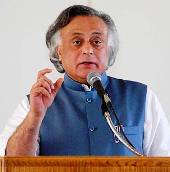 | « Back to article | Print this article |
 As the Planning Commission eyes high growth in the 12th Five-Year Plan, Environment Minister Jairam Ramesh on Monday cautioned that some amount of give-and-take between rapid economic expansion and environmental concerns would have to be made in the next Plan period, which starts from 2012-13.
As the Planning Commission eyes high growth in the 12th Five-Year Plan, Environment Minister Jairam Ramesh on Monday cautioned that some amount of give-and-take between rapid economic expansion and environmental concerns would have to be made in the next Plan period, which starts from 2012-13.
The Planning Commission is likely to peg economic growth at 9-9.5 per cent annually in the next plan.
Ramesh, reportedly under fire over the issue of economic growth and environment, said, "Low-carbon pathway will have some trade-offs, some choices to make." He said the country should be kept abreast of these choices.
Ramesh also announced the constitution of a panel, to be chaired by noted environmental economist Partha Dasgupta of Cambridge University, to precisely study the impact of high growth on environment and ecology.
"This expert group will provide a road map for 'green' National Accounts. . .By 2015, we would report gross domestic product after taking into account environmental costs," Ramesh said after releasing an interim report on low-carbon strategies for inclusive growth.
The panel will also include distinguished economists Nitin Desai, Vijay Kelkar and Kirit Parikh, he said.
Planning Commission Deputy Chairman Montek Singh Ahluwalia said, "I fully endorse the view of Ramesh that growth should be sustainable and it is desirable that we should reduce emission intensity."
Meanwhile, Parikh submitted an interim report to the Planning Commission on low-carbon
"Some of the members felt such an upfront tax would be unfair to the manufacturers as upfront costs are important determinant in vehicle choice," the expert group said.
However, differing with the view, Parikh said, "If you are putting heavy tax on petrol because it is for luxury consumption and if you don't want to put the similar tax on diesel, then obviously we have to put the same kind of tax on diesel vehicles like SUVs and others."
"If the government desires, it could consider imposing an upfront tax on personal (diesel) vehicles," he added.
"We have to consider ways through which distorted pricing of petrol would stop," Parikh said.
Image: Jairam Ramesh